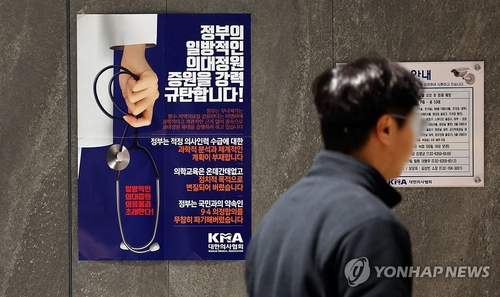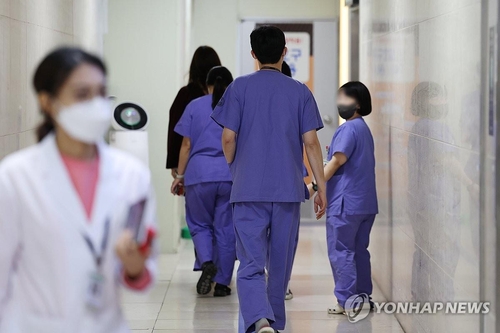- California Assembly OKs highest minimum wage in nation
- S. Korea unveils first graphic cigarette warnings
- US joins with South Korea, Japan in bid to deter North Korea
- LPGA golfer Chun In-gee finally back in action
- S. Korea won’t be top seed in final World Cup qualification round
- US men’s soccer misses 2nd straight Olympics
- US back on track in qualifying with 4-0 win over Guatemala
- High-intensity workout injuries spawn cottage industry
- CDC expands range of Zika mosquitoes into parts of Northeast
- Who knew? ‘The Walking Dead’ is helping families connect
Doctors poised for walkout as gov’t pushes for hike in med school enrollment quota
A major association of medical doctors on Wednesday signaled a possible general strike in protest of the government’s planned hike in the enrollment quota for medical schools, in an intensifying clash feared to cause a vacuum in the medical system.
The Korean Medical Association (KMA) said it will set up an emergency council to block the government’s move, a decision reached at the general meeting of delegates held to discuss its collective action plans.
“We must form the strongest emergency committee and sound the alarm to the government over its arrogance through a strong struggle in which all members participate,” Park Seong-in, chief of the KMA delegates, said.
Specifics regarding the action plans are expected to be decided later next week, according to KMA officials.

The possibility of a nationwide strike by doctors came after the government announced a plan to increase the enrollment quota for medical students by 2,000 next year.
The medical community has strongly protested the decision, claiming it would not help solve the chronic shortages of doctors in rural areas but aggravate problems associated with an oversupply of medical personnel in the market.
The government believes the increase in the medical student quota will help make up for the shortfall in the so-called “less popular” categories, like pediatrics and obstetrics.
But the doctors say establishing public hospitals and offering better salaries will be more effective in encouraging doctors to work outside of the metropolitan region and at public health care facilities.
In a bid to block the potential strike, the health ministry ordered training hospitals to reject a collective submission of letters of resignation from residents, to block them from carrying out the strike as non-medical personnel by law.
Unless they step down legally as doctors, the residents must return to work if the government issues an administrative order because doctors are classified as essential workers.
The government reached the decision in an interagency meeting with related ministries and agencies held to discuss responses to the looming strike, officials said.
In a separate statement, Park Dan, the head of the Korea Intern Resident Association (KIRA), said trainee doctors would review “all necessary measures” against the government’s plan.
Earlier this week, KIRA said its poll of around 10,000 doctors showed that 88.2 percent of the respondents will carry out collective action, including strikes, should the government proceed with raising the medical school quota.









![일본 사도광산 [서경덕 교수 제공. 재판매 및 DB 금지]](http://www.koreatimesus.com/wp-content/uploads/2024/07/PYH2024072610800050400_P4-copy-120x134.jpg)


